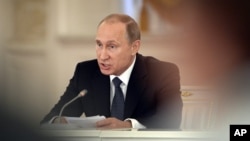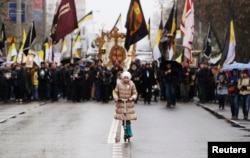President Vladimir Putin has urged Russia's parliament to develop and implement federal legislation on "the Russian nation" to clarify and further regulate ethnic relations in the country. While the proposal has not been fleshed out, it is receiving mixed reviews.
"What we really absolutely can and must work on — what we should think about and start practical work on — is a law on the Russian nation," Putin said at a meeting Monday of Russia's Council for Interethnic Relations in the southern Russian city of Astrakhan.
Asked for details about the proposed law, Putin's spokesman, Dmitry Peskov, said it was an "idea" supported by the president and that he did not want to "go into details."
"Let's wait for the experts to work on this issue," Peskov added.
Despite the lack of details, Chief Rabbi of Russia Berel Lazar praised Putin's proposal. He told the Interfax news agency that it is "a symbol of a new stage of Russia's development," the country's transformation from one divided between ethnic groups to one based "on the principle of the civic nation, uniting all people in the country, regardless of their nationality, color or faith."
Kremlin critics, however, are less impressed.
"Putin's nation aspires to world importance; it fights in Syria, worries about the American elections and even, rumor has it, wants to stage something in Montenegro," wrote journalist and blogger Oleg Kashin.
"My nation has more modest tastes. ... My nation, one of many post-imperial nations in Eastern Europe, consists of millions of people who are often unsettled, unhappy, poor, with outdoor toilets and instant noodles in the saucepan. I believe it is immoral to involve this nation in all kinds of megalomaniacal projects while the primary right, the right to a human life, has not yet been implemented."
Xenophobia, racism and nationalism are on the rise across Europe, and Russia has seen particularly extreme manifestations of these trends. A "Russian March" held by nationalists in Moscow annually has increasingly featured xenophobic, racist and anti-LGBT rhetoric, including the slogan "Russia for Russians."
In 2013, 20 people were killed in Russian in racist and neo-Nazi attacks. Advertisements for apartment rentals often include such requirements for potential tenants as "must be of Slavic appearance," "only ethnic Russians are eligible to apply" or "whites only."
Danila Galperovich in Moscow contributed to this report.





